-
 Bitcoin
Bitcoin $84,248.9449
-1.21% -
 Ethereum
Ethereum $1,575.2066
-1.39% -
 Tether USDt
Tether USDt $0.9998
0.02% -
 XRP
XRP $2.0496
-1.58% -
 BNB
BNB $590.5963
-0.05% -
 Solana
Solana $136.9000
-1.45% -
 USDC
USDC $0.9998
0.02% -
 TRON
TRON $0.2450
1.05% -
 Dogecoin
Dogecoin $0.1538
-2.80% -
 Cardano
Cardano $0.6156
-1.87% -
 UNUS SED LEO
UNUS SED LEO $9.3599
0.20% -
 Chainlink
Chainlink $12.9425
1.25% -
 Avalanche
Avalanche $19.3715
-0.97% -
 Toncoin
Toncoin $2.9763
0.17% -
 Stellar
Stellar $0.2422
-1.72% -
 Shiba Inu
Shiba Inu $0.0...01217
-0.33% -
 Hedera
Hedera $0.1624
-2.16% -
 Sui
Sui $2.1068
-1.63% -
 Bitcoin Cash
Bitcoin Cash $333.9150
-1.07% -
 Polkadot
Polkadot $3.8227
2.22% -
 Hyperliquid
Hyperliquid $17.6552
-1.66% -
 Litecoin
Litecoin $75.9125
-0.15% -
 Dai
Dai $1.0000
0.02% -
 Bitget Token
Bitget Token $4.3821
-1.98% -
 Ethena USDe
Ethena USDe $0.9991
0.01% -
 Pi
Pi $0.6282
-3.01% -
 Monero
Monero $214.2181
-0.28% -
 Uniswap
Uniswap $5.1977
-1.01% -
 Pepe
Pepe $0.0...07351
1.98% -
 Aptos
Aptos $4.9456
2.56%
What is the legal and regulatory environment of blockchain technology?
Blockchain's legal status is globally inconsistent, ranging from bans to regulatory sandboxes. Regulations often target applications like cryptocurrencies, focusing on AML/KYC, taxation, and data protection, highlighting the need for international cooperation to create a unified framework.
Mar 21, 2025 at 10:29 am
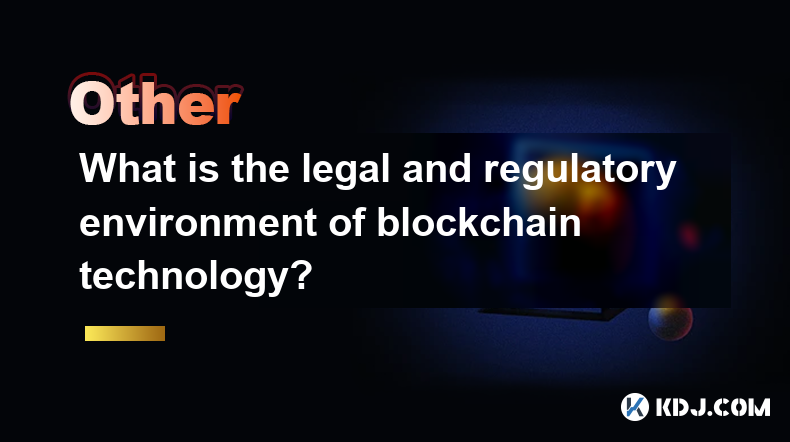
Key Points:
- Blockchain technology's legal status varies significantly across jurisdictions, ranging from outright bans to regulatory sandboxes.
- The legal framework often focuses on the applications of blockchain, such as cryptocurrencies, rather than the technology itself.
- Key legal concerns include anti-money laundering (AML), know-your-customer (KYC) compliance, taxation of cryptocurrency transactions, and data protection.
- Regulatory bodies are still grappling with how to effectively regulate decentralized technologies while fostering innovation.
- International cooperation is crucial to establish a consistent global regulatory framework for blockchain.
What is the legal and regulatory environment of blockchain technology?
The legal and regulatory landscape surrounding blockchain technology is complex and rapidly evolving. There isn't a single, globally unified approach. Instead, jurisdictions are taking diverse paths, reflecting varying levels of understanding and acceptance of the technology's potential and risks. This leads to significant legal uncertainty for businesses operating in the blockchain space.
The legal treatment often hinges on how blockchain is being used. For instance, the use of blockchain for tracking supply chains might face less stringent regulations compared to its use in facilitating cryptocurrency transactions. This distinction highlights the challenge regulators face: balancing the need to regulate potential risks with the desire to encourage innovation.
Many jurisdictions focus their regulations on cryptocurrencies, the most visible application of blockchain technology. This often involves addressing concerns related to money laundering and terrorist financing. Regulations frequently mandate anti-money laundering (AML) and know-your-customer (KYC) procedures for cryptocurrency exchanges and other businesses handling digital assets. These requirements aim to trace the origin and flow of funds to prevent illicit activities.
Taxation is another significant legal hurdle. The taxability of cryptocurrency transactions varies considerably. Some countries treat cryptocurrency as property, subject to capital gains taxes on profits from trading. Others are still developing their tax frameworks for digital assets, leading to ambiguity and potential compliance challenges. The lack of a standardized global approach creates complexities for individuals and businesses engaging in cross-border cryptocurrency transactions.
Data protection is also a key area of legal concern. Blockchain's inherent transparency, while beneficial in some contexts, raises concerns about privacy. Regulations like the General Data Protection Regulation (GDPR) in Europe impose strict rules on the collection, processing, and storage of personal data. The application of these regulations to blockchain technology requires careful consideration, especially for permissioned blockchains where data might be shared among multiple parties.
The regulatory landscape is further complicated by the decentralized nature of many blockchain networks. Traditional regulatory approaches often struggle to effectively govern entities that are not centralized and lack a single point of control. This has led to the exploration of alternative regulatory strategies, such as regulatory sandboxes, which allow businesses to test innovative blockchain applications under a controlled environment with regulatory oversight.
International cooperation is vital for creating a consistent global regulatory framework for blockchain. The decentralized nature of blockchain makes it challenging for individual countries to effectively regulate it alone. International regulatory harmonization would help to create a more predictable and stable environment for businesses operating in the global blockchain ecosystem. However, achieving such harmonization presents significant political and practical challenges.
Common Questions and Answers:
Q: Is blockchain technology itself illegal?
A: No, blockchain technology is not inherently illegal. The legality depends on its application. The technology itself is neutral; it's the use cases that attract regulatory scrutiny.
Q: Are all cryptocurrencies illegal?
A: No, not all cryptocurrencies are illegal. However, many jurisdictions have specific regulations regarding the use and trading of cryptocurrencies, focusing on AML/KYC compliance and tax implications. Some cryptocurrencies might be banned in certain countries.
Q: How are blockchain-based businesses regulated?
A: The regulation of blockchain-based businesses varies depending on the specific business model and jurisdiction. It typically involves compliance with AML/KYC regulations, tax laws, and data protection regulations, among others. The regulatory approach is often evolving.
Q: What is a regulatory sandbox?
A: A regulatory sandbox is a controlled environment where businesses can test innovative blockchain applications under the supervision of regulatory authorities. It allows for experimentation and innovation while minimizing potential risks.
Q: What are the challenges in regulating blockchain globally?
A: The decentralized nature of many blockchains, jurisdictional differences, and the rapid pace of technological development create significant challenges for establishing a consistent global regulatory framework. International cooperation is crucial but difficult to achieve.
Q: What are the potential future developments in the legal and regulatory environment of blockchain?
A: Future developments may include more harmonized international regulations, the development of specific blockchain-focused laws, and further refinement of regulatory sandboxes. The evolving technology and its applications will continue to shape the legal and regulatory landscape.
Q: How does GDPR affect blockchain?
A: GDPR applies to personal data processed through blockchain technology, requiring compliance with data protection principles, such as data minimization and the right to be forgotten. The application of GDPR to blockchain requires careful consideration, especially regarding data transparency and access.
Q: What are the risks associated with unregulated blockchain activities?
A: Risks include increased potential for fraud, money laundering, and other illegal activities. Lack of regulatory clarity can hinder innovation and investment in the blockchain space. Unregulated activities can also harm consumers and investors.
Disclaimer:info@kdj.com
The information provided is not trading advice. kdj.com does not assume any responsibility for any investments made based on the information provided in this article. Cryptocurrencies are highly volatile and it is highly recommended that you invest with caution after thorough research!
If you believe that the content used on this website infringes your copyright, please contact us immediately (info@kdj.com) and we will delete it promptly.
- XRP Has Officially Surpassed Ethereum (ETH) in Fully Diluted Market Cap
- 2025-04-20 20:00:13
- Best Wallet Token ($BEST) is disrupting the $11 billion crypto wallet space with a new super app and strategic tokenomics.
- 2025-04-20 20:00:13
- Investor Forecasts 50-Fold Return On XRP
- 2025-04-20 19:55:12
- Sui Has Been Making Waves Lately, with Its Ecosystem Drawing in Fresh Attention
- 2025-04-20 19:55:12
- Ethereum (ETH) Price Remains at March 2023 Levels Despite Community Activity and Internal Changes
- 2025-04-20 19:50:13
- XRP Ledger (XRPL) DEX Promises New Opportunities for Tokenized Assets
- 2025-04-20 19:50:13
Related knowledge
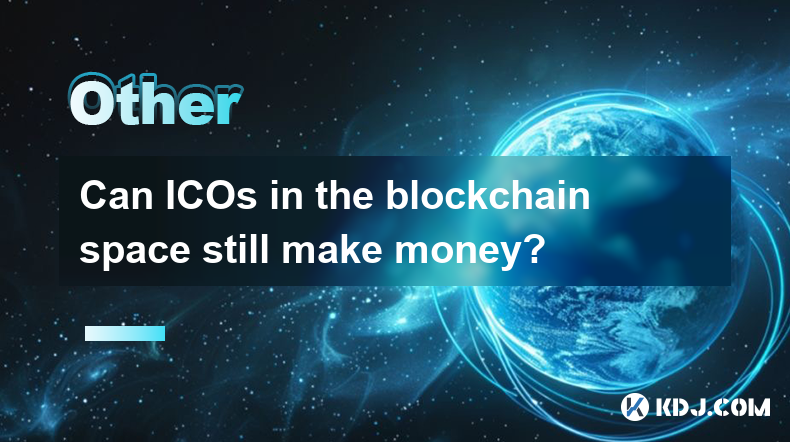
Can ICOs in the blockchain space still make money?
Apr 17,2025 at 08:29pm
The landscape of Initial Coin Offerings (ICOs) in the blockchain space has evolved significantly since their peak in 2017 and 2018. Despite the increased regulatory scrutiny and the rise of alternative fundraising methods like Security Token Offerings (STOs) and Initial Exchange Offerings (IEOs), ICOs can still be a viable way to raise funds and generat...
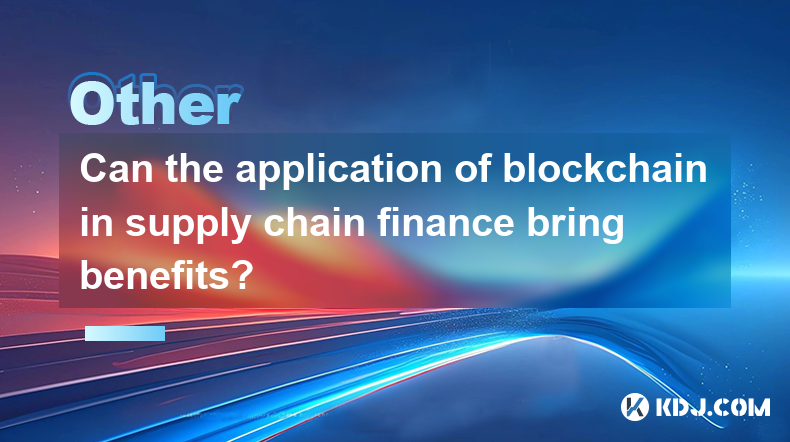
Can the application of blockchain in supply chain finance bring benefits?
Apr 15,2025 at 04:00pm
Can the application of blockchain in supply chain finance bring benefits? The integration of blockchain technology into supply chain finance has garnered significant attention in the cryptocurrency and financial sectors. This article explores how blockchain can potentially revolutionize supply chain finance, detailing its benefits and providing a compre...

Does the ranking of Chinese blockchain apps include cross-chain applications?
Apr 14,2025 at 04:00pm
The ranking of Chinese blockchain apps is a comprehensive evaluation that takes into account various aspects such as user base, transaction volume, and technological innovation. A pertinent question arises regarding whether these rankings include cross-chain applications. Cross-chain applications, which allow different blockchain networks to interact an...
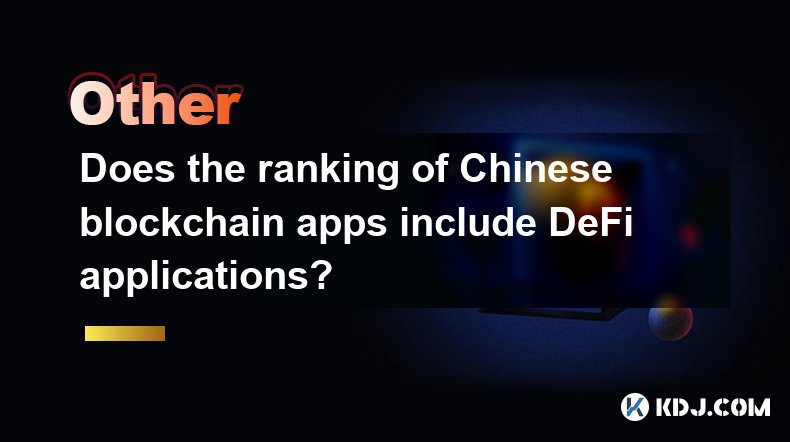
Does the ranking of Chinese blockchain apps include DeFi applications?
Apr 15,2025 at 06:57am
The ranking of Chinese blockchain apps is a comprehensive list that showcases the most popular and influential applications within the cryptocurrency ecosystem. One question that often arises is whether these rankings include DeFi applications. To answer this, we need to delve into the specifics of how these rankings are compiled and what types of appli...
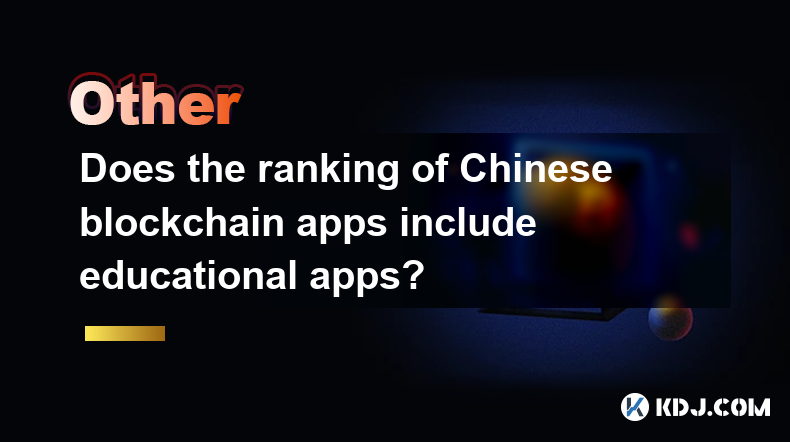
Does the ranking of Chinese blockchain apps include educational apps?
Apr 16,2025 at 03:35am
The ranking of Chinese blockchain apps often includes a variety of categories, from finance and gaming to social networking and beyond. One question that frequently arises is whether these rankings include educational apps. To address this, we need to delve into the specifics of how blockchain apps are categorized and ranked in China, and whether educat...
Does the ranking of Chinese blockchain apps include enterprise-level applications?
Apr 15,2025 at 06:42am
The ranking of Chinese blockchain apps often includes a variety of applications, ranging from consumer-focused to enterprise-level solutions. Understanding the scope and criteria for these rankings is essential to determine if enterprise-level applications are included. This article delves into the specifics of how Chinese blockchain app rankings are co...

Can ICOs in the blockchain space still make money?
Apr 17,2025 at 08:29pm
The landscape of Initial Coin Offerings (ICOs) in the blockchain space has evolved significantly since their peak in 2017 and 2018. Despite the increased regulatory scrutiny and the rise of alternative fundraising methods like Security Token Offerings (STOs) and Initial Exchange Offerings (IEOs), ICOs can still be a viable way to raise funds and generat...

Can the application of blockchain in supply chain finance bring benefits?
Apr 15,2025 at 04:00pm
Can the application of blockchain in supply chain finance bring benefits? The integration of blockchain technology into supply chain finance has garnered significant attention in the cryptocurrency and financial sectors. This article explores how blockchain can potentially revolutionize supply chain finance, detailing its benefits and providing a compre...

Does the ranking of Chinese blockchain apps include cross-chain applications?
Apr 14,2025 at 04:00pm
The ranking of Chinese blockchain apps is a comprehensive evaluation that takes into account various aspects such as user base, transaction volume, and technological innovation. A pertinent question arises regarding whether these rankings include cross-chain applications. Cross-chain applications, which allow different blockchain networks to interact an...

Does the ranking of Chinese blockchain apps include DeFi applications?
Apr 15,2025 at 06:57am
The ranking of Chinese blockchain apps is a comprehensive list that showcases the most popular and influential applications within the cryptocurrency ecosystem. One question that often arises is whether these rankings include DeFi applications. To answer this, we need to delve into the specifics of how these rankings are compiled and what types of appli...

Does the ranking of Chinese blockchain apps include educational apps?
Apr 16,2025 at 03:35am
The ranking of Chinese blockchain apps often includes a variety of categories, from finance and gaming to social networking and beyond. One question that frequently arises is whether these rankings include educational apps. To address this, we need to delve into the specifics of how blockchain apps are categorized and ranked in China, and whether educat...

Does the ranking of Chinese blockchain apps include enterprise-level applications?
Apr 15,2025 at 06:42am
The ranking of Chinese blockchain apps often includes a variety of applications, ranging from consumer-focused to enterprise-level solutions. Understanding the scope and criteria for these rankings is essential to determine if enterprise-level applications are included. This article delves into the specifics of how Chinese blockchain app rankings are co...
See all articles























































































